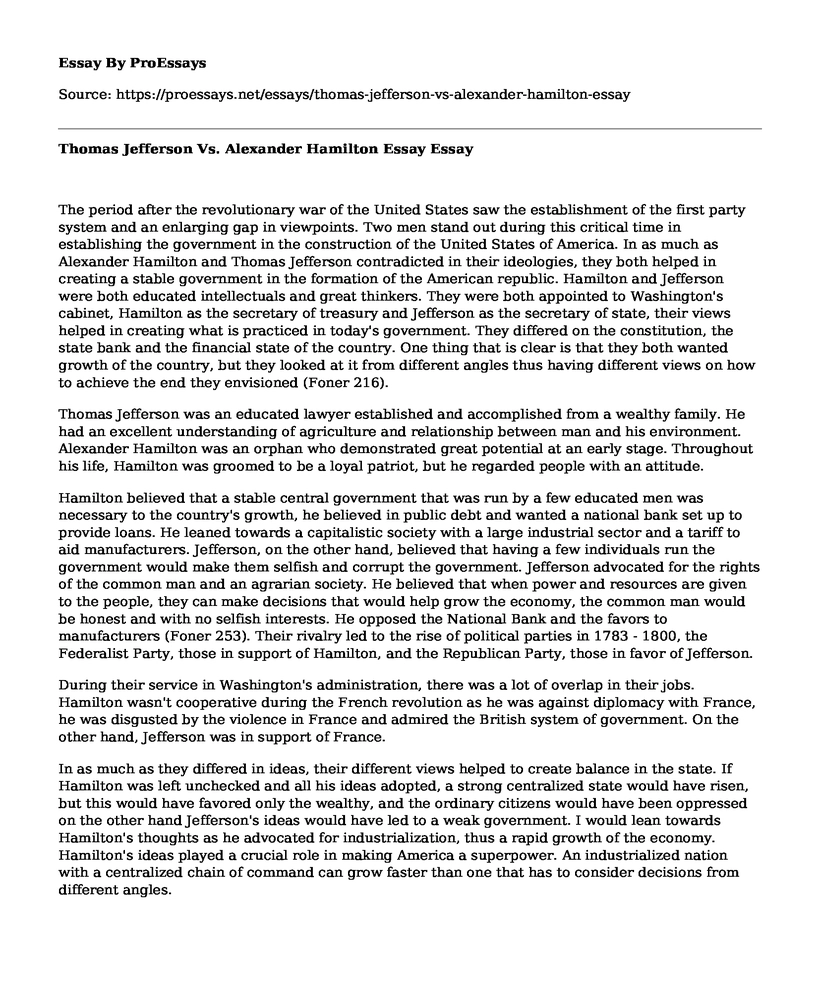The period after the revolutionary war of the United States saw the establishment of the first party system and an enlarging gap in viewpoints. Two men stand out during this critical time in establishing the government in the construction of the United States of America. In as much as Alexander Hamilton and Thomas Jefferson contradicted in their ideologies, they both helped in creating a stable government in the formation of the American republic. Hamilton and Jefferson were both educated intellectuals and great thinkers. They were both appointed to Washington's cabinet, Hamilton as the secretary of treasury and Jefferson as the secretary of state, their views helped in creating what is practiced in today's government. They differed on the constitution, the state bank and the financial state of the country. One thing that is clear is that they both wanted growth of the country, but they looked at it from different angles thus having different views on how to achieve the end they envisioned (Foner 216).
Thomas Jefferson was an educated lawyer established and accomplished from a wealthy family. He had an excellent understanding of agriculture and relationship between man and his environment. Alexander Hamilton was an orphan who demonstrated great potential at an early stage. Throughout his life, Hamilton was groomed to be a loyal patriot, but he regarded people with an attitude.
Hamilton believed that a stable central government that was run by a few educated men was necessary to the country's growth, he believed in public debt and wanted a national bank set up to provide loans. He leaned towards a capitalistic society with a large industrial sector and a tariff to aid manufacturers. Jefferson, on the other hand, believed that having a few individuals run the government would make them selfish and corrupt the government. Jefferson advocated for the rights of the common man and an agrarian society. He believed that when power and resources are given to the people, they can make decisions that would help grow the economy, the common man would be honest and with no selfish interests. He opposed the National Bank and the favors to manufacturers (Foner 253). Their rivalry led to the rise of political parties in 1783 - 1800, the Federalist Party, those in support of Hamilton, and the Republican Party, those in favor of Jefferson.
During their service in Washington's administration, there was a lot of overlap in their jobs. Hamilton wasn't cooperative during the French revolution as he was against diplomacy with France, he was disgusted by the violence in France and admired the British system of government. On the other hand, Jefferson was in support of France.
In as much as they differed in ideas, their different views helped to create balance in the state. If Hamilton was left unchecked and all his ideas adopted, a strong centralized state would have risen, but this would have favored only the wealthy, and the ordinary citizens would have been oppressed on the other hand Jefferson's ideas would have led to a weak government. I would lean towards Hamilton's thoughts as he advocated for industrialization, thus a rapid growth of the economy. Hamilton's ideas played a crucial role in making America a superpower. An industrialized nation with a centralized chain of command can grow faster than one that has to consider decisions from different angles.
Works Cited
Foner, Eric. Voices of Freedom: A Documentary History. , 2017. Print.
Davidson, James W, and Mark H. Lytle. After the Fact: The Art of Historical Detection. New York: McGraw-Hill, 2010. Print.
Foner, Eric. Give Me Liberty!: An American History. New York: W.W. Norton, 2016. Print.
Cite this page
Thomas Jefferson Vs. Alexander Hamilton Essay. (2022, Jun 06). Retrieved from https://proessays.net/essays/thomas-jefferson-vs-alexander-hamilton-essay
If you are the original author of this essay and no longer wish to have it published on the ProEssays website, please click below to request its removal:
- John Knox and His Impact on Scotland's History
- Difficulties Faced by the Confederate States of America Essay
- Comparison Between Julius Caesar and Abraham Lincoln Essay
- Three Types of Elections in Texas - Essay Sample
- Race and Identity Essay Example
- Separation of Powers & Federalist 51: Publius Defends Constitution - Essay Sample
- Essay Sample on Ethnicity: Historical Experiences







